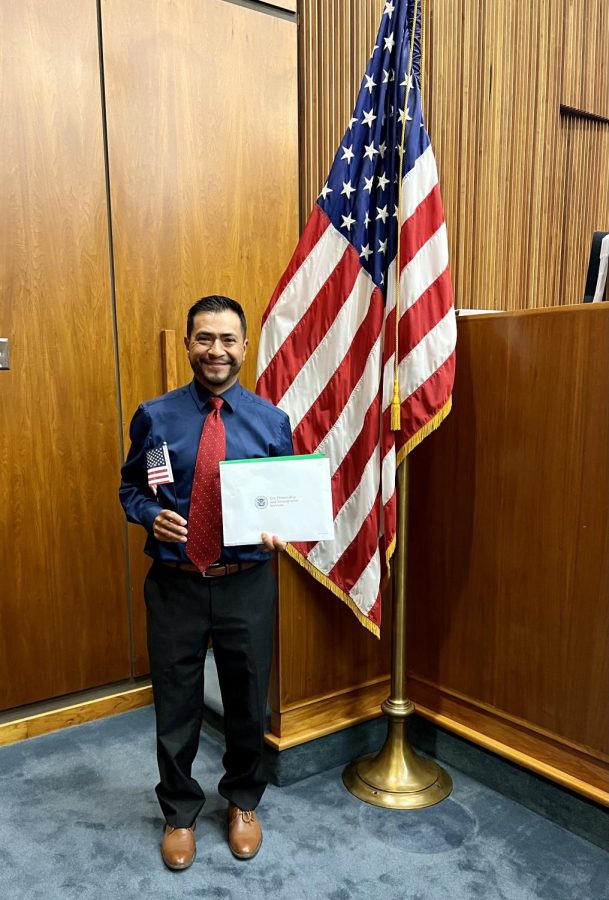Spanish teacher becomes an American citizen over the summer
October 19, 2022
After 22 years living in the United States (U.S.), Spanish teacher Juan Carlos Sanchez has gained his American citizenship. He describes it as an “awesome feeling.”
“I’ve been living here [longer] now than in Mexico, so I feel like I love this country as much as I love Mexico,” he said. “But I’m more grateful towards the United States because of the opportunities that I encountered here.”
Although citizenship has not physically changed his life, Sanchez says he feels “different.”
“Now it feels like you get the sense of belonging. You get the sense of ‘okay, now I can call this place my home’,” he said. “You don’t feel anymore like just another immigrant– which in a way I’m still another immigrant– and it gives you a sense of pride, as well, and love for the American people and for the country overall.”
Sanchez’s journey to citizenship was not short-lived. At 18, he acquired a temporary work VISA and made the trip from Jalisco, Mexico in hopes of finding better work in order to make enough money to return to Mexico for post-secondary school. However, his plans for going back were interrupted when, in Lincoln, he met the woman he eventually married. He began work in Lincoln as a busboy at the Mexican restaurant El Toro, and eventually went to college at the University of Nebraska Lincoln. to earn his teaching certificate.
Sanchez says it was difficult adjusting to the Lincoln lifestyle when he first arrived due to language barriers and cultural differences.
While his main struggle was inability to communicate with customers at the restaurant, the next thing he experienced was uncomfortable moments, ignorant comments or unwelcoming people.
“Sometimes in the restaurant people just start asking questions that are personal, you know,” Sanchez said. “In regards of your personal life, they assume things: they think that you are undocumented or they’ll make racial comments, you know, things like that.”
He says he was lucky the discrimination was infrequent.
“But it was when this happened when you start thinking, well, not everybody is good with me being here,” he said.
On the other hand, he adjusted quickly thanks to a great sense of community and accepting nature of many.
“The beauty about Lincoln is that most people in Lincoln are very welcoming, and are naturally caring people and that’s one of the main reasons I decided to stay in Lincoln,” he said, describing the LSE community as similarly friendly.
Sanchez says he is thankful to now feel as though he is officially a part of the community.
The naturalization process is not simple, but immigration was relatively easy considering his sister already lived in Lincoln.
“You already have a person living here so [the Immigrant Legal Center in Omaha] knows that you have a place to stay, and they don’t have to worry about finding you a home or anything like that,” he said.
There are many requirements that go into becoming an American citizen, such as an English language and American history test, and having a green card for five years. That’s why it took Sanchez so long to receive his citizenship, although he admits he also was comfortable and not in a rush.
“And also…it gets expensive [For] every form that you fill out, you have to pay for it and a lot of them are very expensive,” he said.









